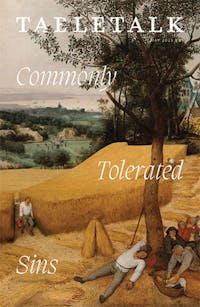
Request your free, three-month trial to Tabletalk magazine. You’ll receive the print issue monthly and gain immediate digital access to decades of archives. This trial is risk-free. No credit card required.
Try Tabletalk NowAlready receive Tabletalk magazine every month?
Verify your email address to gain unlimited access.
Ignorance is bliss? Not for the Christian. Why? Because the Christian faith is rooted in truth. God created humanity with minds meant to know Him and worship Him in light of that knowledge.
What we think matters. In the Apostle Paul’s magnum opus, Romans, after he spends eleven chapters detailing the theology of the Christian faith, he turns his attention to its application in chapter 12. “Do not be conformed to this world, but be transformed by the renewal of your mind, that by testing you may discern what is the will of God, what is good and acceptable and perfect” (v. 2). The nonthinking Christian doesn’t exist. Training our minds to think rightly about the things of God is our lifelong calling and produces life. Complacency with what we know of God and His truth is a toxic poison.
In light of this calling, Paul prays for the church in Colossae, that they
may be filled with the knowledge of his will in all spiritual wisdom and understanding, so as to walk in a manner worthy of the Lord, fully pleasing to him: bearing fruit in every good work and increasing in the knowledge of God. (Col. 1:9–10)
Paul desires the Colossians to be filled with knowledge. They are the vessels that receive; God gives the knowledge. But this does not mean that the Christian remains passive in the acquisition of knowledge. If that were the case, Paul need not pray. God gives His Word that we might grow in knowledge of Him and His will. It remains incumbent on us to keep putting ourselves in the way of this knowledge by reading, meditating upon, and praying over His Word. Like David, we seek to devour the Scriptures because they prove sweeter than honey to the Christian’s taste (Ps. 119:103).

Yet some still accuse knowledge of killing the Spirit-led life. But notice that knowledge is not a dead-end road in Paul’s mind. He clearly states that right knowledge leads to right walking. He prays that the Colossians would be filled with knowledge “so as to walk in a manner worthy of the Lord, fully pleasing to him: bearing fruit in every good work and increasing in the knowledge of God” (Col. 1:10). The knowledge we seek to be filled with is not so that we can win Bible trivia contests but so that we might live to the glory of God. All theology is meant to lead to doxology. In a very real sense, we are not growing in knowledge of God unless we are bearing fruit to the glory of God. And we are not growing in fruit to the glory of God unless we are growing in knowledge of God. Knowledge and fruitfulness maintain a symbiotic relationship. As you and I bear more and more fruit for the kingdom, our knowledge of God increases. As we increase in our knowledge of God, our fruit increases. One stirs and feeds the other.
The Christian life is a continual pursuit of continual growth. And that cannot and will not occur apart from growing in knowledge. We want to know more of God. Or at least we should. Ignorance is not bliss, and it is not holy. As the prophet said, “Let us know; let us press on to know the Lord” (Hos. 6:3).
